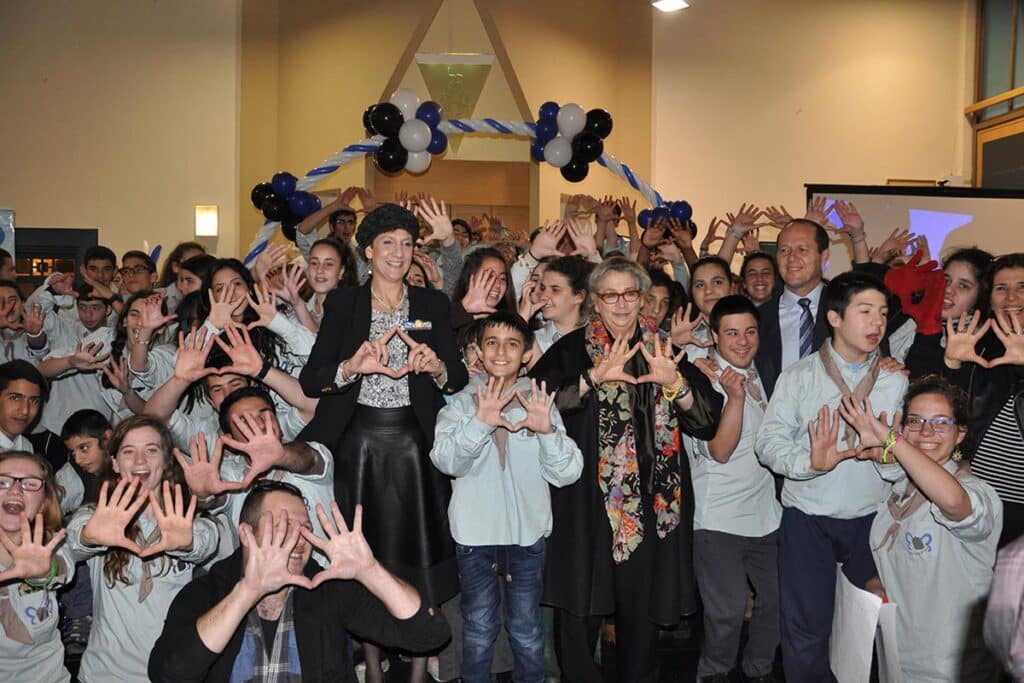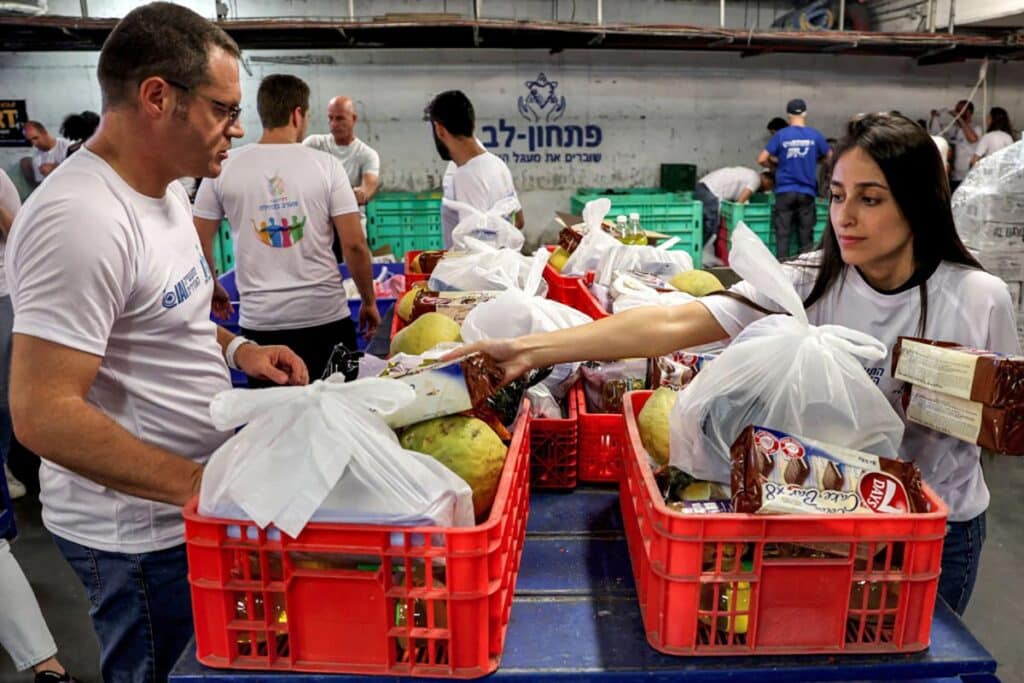
When you think of the world’s happiest countries, you probably imagine somewhere peaceful and serene, with gorgeous landscapes and really good healthcare.
But, one of the top 10 happiest countries bucks that trend: Israel.
Ranking as the eighth-happiest country in the world in the 2025 World Happiness Report, Israel is the tinderbox of the Middle East. Both internally and externally, the country is full of conflict. Protests, heated politics, rocket fire, and terrorist attacks fill day-to-day life in Israel.
That high ranking is consistent. The lowest Israel has ranked in the World Happiness Report is 14th place out of 147 countries. In some years, it has even reached fourth place.
Israel is the only Middle Eastern country to rank in the top 20 happiest countries in this year’s report. (The United Arab Emirates was the next highest-ranked at 21st place)
With all the stress and tension affecting daily life, how does Israel consistently rank as one of the happiest countries on earth?
How is happiness measured?
It’s important to understand that the World Happiness Report is based on the results of a single question asked by the Gallup World Poll, known as the Cantril Ladder.
The Cantril Ladder method asks respondents to imagine a ladder with 11 numbered steps, with 0 at the bottom and 10 at the top. The top of the ladder represents the best possible life, while the bottom represents the worst. The question is then asked, “On which step of the ladder would you say you personally feel you stand at this time?”
Israelis pretty consistently put themselves at around a seven or eight on the Cantril Ladder, but that only tells us that they’re happy with their lives, not why they’re happy.
To answer that question, the World Happiness Report also records six key variables that can help to explain why countries scored the way they did:
- Gross domestic product (GDP) per capita – I.e., how prosperous a country is
- Social support – I.e., whether or not people in a country have relatives or friends they can count on to help them
- Healthy life expectancy
- Freedom – I.e., if people in a country are satisfied or dissatisfied with their freedom to choose what to do with their lives
- Generosity – This is determined by asking respondents if they gave money to charity in the past month
- Perceptions of corruption – This is determined by asking respondents if they feel corruption is widespread throughout the government and if corruption is widespread within businesses
According to the report, there were two main factors affecting Israel’s score: social support and GDP per capita.
Why is Israel such a happy country? It’s all in the family
In a conversation with Unpacked, Israeli journalist and political analyst Haviv Rettig Gur pointed out that Israel is a small country filled with big families. Even when your family drives you nuts, having them around generally makes you happier.
“One of the things Israel has in overabundance, almost unique among Westerners, is social capital, is communal capital, are tight-knit communities, strong, tight-knit families that don’t spread across continents because kids go to college and somebody takes a job in L.A.,” explained Rettig Gur.
The World Happiness Report agrees wholeheartedly. For Israel, the biggest factor affecting its happiness was social support, whether or not Israelis have relatives or friends they can count on to help them. On that metric, Israel ranked 13th worldwide.
Israeli families are super tight-knit, and it’s those close communities that give Israelis the hope to go on.
“At the family level, at the personal loneliness level, at the larger national solidarity, communal level, at all these different layers, Israelis live within tight-knit, strong communities and have these tight-knit bonds,” noted Rettig Gur. “The same thing that’s true about families is absolutely true about communities. Every single time somebody gives birth on my block, it goes out on a WhatsApp [message] and everyone cooks for them.”
Those tight-knit communities are one of the reasons Israel stands out, because in the rest of the world, there’s a major loneliness crisis. About a quarter of the world’s population reports feeling lonely, and some countries have even appointed special ministers of loneliness to combat this epidemic.
That epidemic of loneliness has especially affected young people in most countries, but in Israel, youth buck that trend.
Israeli youth finding community amid worldwide loneliness epidemic
This year’s World Happiness Report found that Israeli young adults have the highest quality of social connections out of 22 countries and regions, meaning young Israelis feel that they can count on their relatives or friends for support when they need it.

A huge part of those connections comes from social connections kids build outside of their homes and schools. Tons of Israeli kids take part in youth groups which give kids a sense of purpose and belonging, which carry on into adulthood.
Whether they’re learning new skills, volunteering, or just hanging out with like-minded friends, kids get to feel like they’re a part of something bigger than themselves. In fact, some Israeli youth movements even have branches outside the country, creating a global community of young activists.
One of these movements is SAHI, the Special Charity Unit, started by Avraham Hayun and Oded Weiss.
SAHI’s goal is to “improve the society of Israel, to make a Tikkun Olam, to make a better world. What we do is we build leaders. We build leaders of doing good,” Hayun explained.
The movement started with teens in underdeveloped neighborhoods. Hayun and Weiss asked these teens to study their community and figure out who might be in need. Late at night, the teens dropped off food packages together.
These anonymous acts of kindness made the teens feel good about themselves while maintaining the dignity of the recipient. The group also pushed teens to see what was going on around them and to make decisions, as a group, about who needed help and who would provide it.
The movement has since spread across Israel, and now these random acts of kindness happen during the day, too.
Acts of kindness bring happiness
These random acts of kindness are another major part of why Israel is so happy.
“The thing about donating your time, your money, is that it’s an act of identification. It’s not just the good you’re doing to the people you’re donating to or the causes you’re donating to. It’s you going out there into the world and investing yourself. That’s an act that counters loneliness,” explained Rettig Gur.
The response of many Israelis to the horrors of Oct. 7 further illustrates this point.
Israel had just lost 1,200 precious souls in the most horrific ways possible. Another 250 were taken into captivity.

Instead of sitting around feeling helpless and hopeless, Israelis sprang into action. Overnight, 15,000 volunteers showed up to do anything they could: Cooking food, ironing uniforms, watching kids, identifying hostages, adopting pets, giving free therapy, taking in the displaced, and donating items to families whose homes were destroyed.
Israelis even stood in line for hours to give blood. The immediate reaction to the worst attack in Israel’s history wasn’t paralysis; it was taking care of each other in any way possible.
That’s because, despite Israelis’ many differences, they all just want to protect their society: a free and open society with opportunities for everyone – even the most marginalized communities.
Strength through diversity
Mike Prashker, the founder of Merchavim, Institute for the Advancement of Shared Citizenship, has lived in Israel for over 40 years, and in that time, he’s seen a lot of progress.
“Life has gotten better in Israel for almost all communities over the decades. Arabs, women, people of faith. There are very few communities that want to go back a decade or two decades, so this has been a country of great historical progress.”
“My daughters both serve in the army. I’m so happy they’re serving in the army they’re serving in now and not the army in which I served 40 years ago, where the women had a very, very undignified role, to put it politely,” said Prashker.
Life has also gotten better for Arab citizens of Israel who are leaders in their fields in hospitals, the sciences, technology, and education. The chairman of Israel’s largest bank, Bank Leumi, was, up until recently, Dr. Samer Haj-Yehia, an Arab citizen. One of his brothers is a top lawyer in one of Israel’s largest firms, while his other brother is a world-renowned heart surgeon.
Israel is also the only LGBTQ-friendly country in the Middle East, with Tel Aviv noted as one of the most LGBTQ-friendly cities in the world.
Israel, of course, still has its challenges. There’s still a lot to be done to improve issues with crime, poverty, racism, and division.
“If you’re a young Arab Israeli woman going to teach in a Jewish town, you’re nervous about the journey because lots of people understandably think that maybe you’re a risk when you’re a young person coming to do your job as a math teacher,” Prashker explained. “Overcoming those fears mutually takes a great deal of personal and communal and societal courage.”
There’s nothing quite like a year of existential threats to make you remember what’s really important. Israelis of all stripes have realized that their survival as a country depends on working together to fix things.
Young Israelis had their childhoods interrupted by a global pandemic and by the worst attack on Jews in nearly 80 years. While the global pandemic divided and isolated everyone from one another, the Oct. 7 attacks brought people together in solidarity and demonstrated the progress Israel has made as a diverse and multicultural society.
However, that diversity brings both unique strengths and challenges. On the one hand, Israel is full of tribal divisions: Jews and Arabs, secular and religious, hardcore settlers and extreme leftists. Many Israelis have lost faith in government institutions, and the country is still very much fighting for its life.
However, Israel is also a country where lifeguards interrupt a peaceful morning at the beach to announce the rescue of hostages. It’s a country where Orthodox Jews will be the first on the scene after an attack, taking on the thankless work of picking up the pieces, and where secular Jews shout good news out the window to their religious neighbors who haven’t heard it yet.
Israel is a country whose Jews will cry with joy when a Bedouin Muslim comes home from 11 months in hell. A country whose Druze soldiers lay down their lives for the Jewish state. A country where Arabs and Jews save each other’s lives every day – whether they’re on the battlefield or in the emergency room.
“The Arab cultural universe in us, the Eastern cultural universe in us, gives us these strengths to push back the epidemic of loneliness. The Western liberal individualism in us allows us to live in this wonderful, strong communal existence while also having freedoms and gay pride parades and choice in life,” Rettig Gur explained.
“We have struck a weird balance between East and West where each side’s strength is the solution to the other side’s problem. I don’t know if it’s sustainable over time, but it’s been quite a few generations already, and it is the source of our happiness. The West wants happiness, [so] it needs to become more Eastern. If the East wants happiness, it needs to take on the great lessons of democracy and liberalism of the West. That combination is our superpower.”
We will dance again
That may sound optimistic or even naive, but it’s true. Tens of thousands of Israelis who lost everything on Oct. 7 are still able to dance in the streets. After the horrors of the Nova festival, it became popular to say, “We will dance again,” and that’s exactly what happened.
“Coming to Israeli dancing, it sets your soul free. We are all going through such difficult times here in Israel, and such pain and sorrow. Sometimes, we have to force ourselves to come to dancing. We even ask ourselves, is it alright? Is it alright for us to go dancing? But there are grandmothers here who have five sons in Gaza at the moment. I have lost ten people I know personally in this terrible war,” Leonie Lachmish told Unpacked.
“I just know that the Jewish choice is ‘bachartem b’chayim,’ you choose life. And if we didn’t choose life, we’d have been extinct long ago because that’s what our enemies want us to be; they want us to be extinct. Whereas all we want to do is live and let live and love.”
“Israel is a deeply happy place. … In our hearts and in our souls, we are happy people, and all we strive for is to be happy, but in a deep sense of the word. So yes, Israel is a happy place, but at the moment, we’re very sad in our happy place,” Lachmish added.
That sense of optimism, of moving forward despite the pain, has characterized the Jewish people throughout the generations.
For example, for two years after the Holocaust, European displaced persons camps had the highest birth rates in the world.
Two-thirds of Europe’s Jews had just been wiped out, and the people in these camps had seen the worst of humanity. They had every reason to just give up, but they did the exact opposite.
From the Exodus from Egypt to the Maccabean revolt against the Greeks, that resilience has carried Jews through millennia of hardship.
That’s where the secret to Israel’s happiness lies: Israel isn’t a happy country because it’s some sort of paradise. It’s a happy country because it’s made up of people who have been taught to cling to life as stubbornly as they can.
